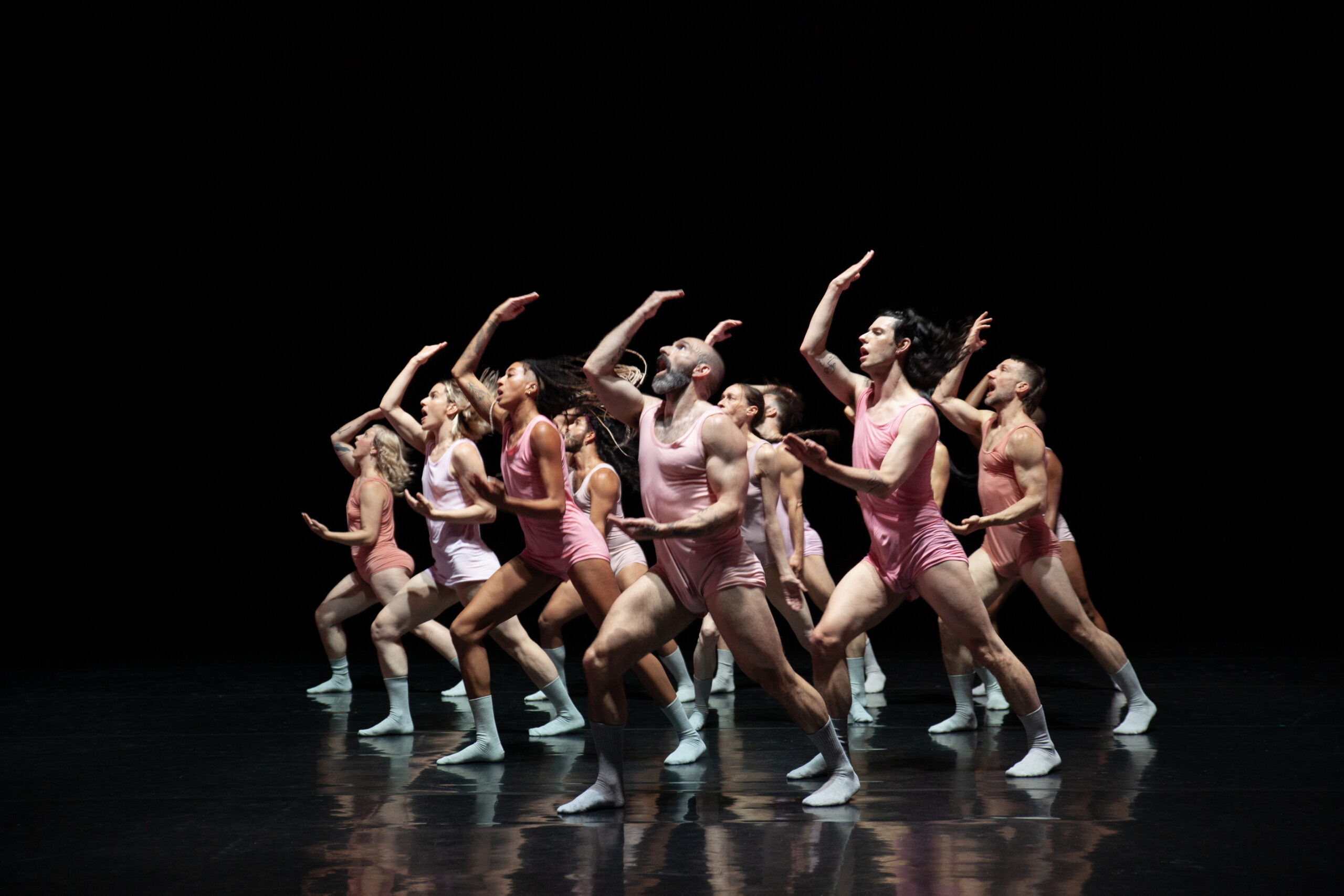love, this mesmerizing despair
amilton de azevedo writes about ODE, by Catherine Gaudet (Canada), premiered in the 2024 Festival TransAmériques (FTA – Tiohtià:ké/Montreal). this text is part of a special coverage; the critic traveled to Canada at the invitation of the FTA.
“To begin by always thinking of love as an action rather than a feeling is one way in which anyone using the word in this manner automatically assumes accountability and responsibility. We are often taught we have no control over our “feelings.” Yet most of us accept that we choose our actions, that intention and will inform what we do. We also accept that our actions have consequences.” (bell hooks, All About Love)
Love. Curtains open, the performers are in their positions. A beat. One dancer moves, as if they are some sort of coxswain for the overflow that lies ahead. All of them face the audience for almost the entirety of ODE (2024, Canada), by Catherine Gaudet. The drum counts at the beat of a resting heart. At one point, the sweatmark on one of the performer’s costumes (designed by Marilène Bastien) is heart shaped. Close to the end, the chorus is a heart beating and the world spinning.
Love. The block of moving lights, designed by Alexandre Pilon-Guay, dances as is the blood flowing through the veins. ODE’s ritualistic choreography carries a smoothness within its strong yet subtle movements that one can almost not perceive as the eleven performers (Rodrigo Alvarenga-Bonilla, Stacey Désilier, Dany Desjardins, Francis Ducharme, Aurélie Ann Figaro, Caroline Gravel, Chi Long, Scott McCabe, James Phillips and Geneviève Robitaille) are gliding through the stage until the whole composition is shifted, as they slide through each other and in and out of the darkness. The ones coming to the forward, the ones left behind. Composition and opposition. What does it mean to be left in the dark?
- Read more: access this link for more theater critics written in english
- Read more: follow ruína acesa’s FTA special coverage
Love. Everlasting desperate love. Inescapable. ODE gospel chants “love” in the beat and off-beat, as the chorus-choir splits individually and collectively for sort of solo moments of bliss and despair. Gaudet’s choreography complexity is performed with precision by the dancers; at the same time, one can see the singularities within each body – as if the costumes and the atmosphere being built are trying to revoke their subjectiveness while they are struggling against it.
Love. Terror. ODE echoes Midsommar (2019), Ari Aster’s folk daylight horror movie, in some manner. In Aster’s work, the idea of the final girl trope is ressignified as the protagonist not only survives, but symbolically rebirths through the sacrifice of a once-loved one. The cult-like vibes both on stage and in the movie carries within it some unavoidable beauty. They are captivating: one can see what is going wrong there at the same time that can be urging to be a part of it.
Love. ODE’s “pop-pagan procession” lightheartedness is almost ingenious. Gaudet manages to organize the piece with a radical naiveness as the chants and moves go on and on and on. As the soundscape builds up an atmospheric score, gestures are subtly changing from joy to anguish. At one point, they try to reach for the hand of one another. They are collectively alone into that ritualistic mandatory positivity. Love, this mesmerizing despair.
Help. The frontality of ODE and their movements towards the audience is almost like an attempt of proselytism – which can be quite effective as one could hear “love” coming from the audience. Chorus, lines, blocks: ODE shapeshifts the composition whilst maintaining the same gestures, being permeated by some degree of a very welcome humor, especially when thinking about the seriousness so quite present within contemporary dance. The critical discourse within ODE is its core but also almost lateral, as it gently permeates the piece. The urge to love as a ritual obligation can be seen as a strong statement regarding the mandatory positivity so present within our society. And, as written by Byung-Chul Han in The Burnout Society, “the violence of positivity does not deprive, it saturates; it does not exclude, it exhausts“. Exhausting love.
Love. Performers’ bodies are dripped in sweat as they just keep on going. The intention within their voices change, suggesting subtexts and different meanings within one word, but the tonus stays the same. ODE is inescapable; an unbelievable performance. Moving lights bathe through the audience, the stage is rawly illuminated, the music’s over and they are one heart-world-body pulsing to this vital movement. Unfinishing love, as euphoria and melancholy are oneness while the curtains close.

